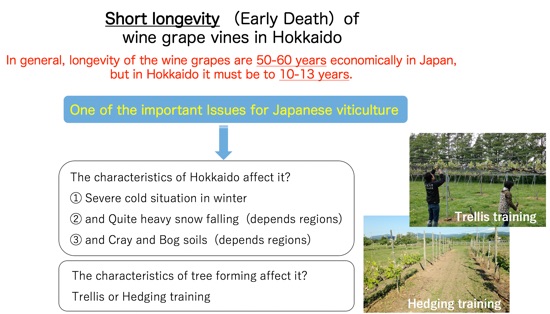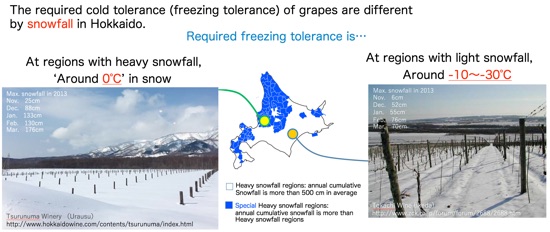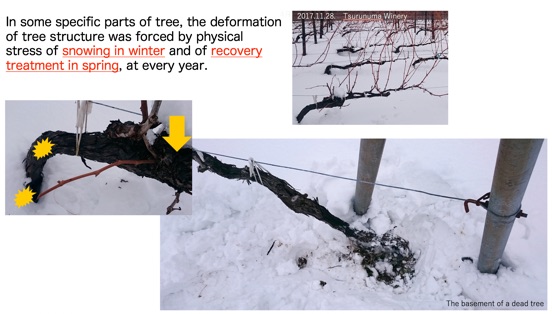Yutaka JITSUYAMA







Research Faculty of Agriculture, Hokkaido University
North 9, West 9, Kita Ward, Sapporo,
Hokkaido, 060-8589 JAPAN
Tel/Fax: +81-(0)11-706-2438
E-mail: y-jitsu ‘at’ res.agr.hokudai.ac.jp
Website: http://www.agr.hokudai.ac.jp/engei/Jitsuyama/Welcome.html
BS 1994 (Tokyo Univ. of Agriculture and Technology) Horticultural Science
MS 1996 (Hokkaido Univ.) Horticultural Science, and Low Temperature Plant Biology
PhD 1999 (Hokkaido Univ.) Horticultural Science, and Low Temperature Plant Biology
2000-2014 (Hokkaido Univ.) Crop Science
2015-Now (Hokkaido Univ.) Horticultural Science
Departments
Division of Bioresources and Product Science
Research Group of Horticultural Science and Landscape Architecture
Laboratory of Horticultural Science
Concentrations
•Soybean: Waterlogging tolerance
•Wheat: Root Penetration Ability
•Millets, Maize
•Potato Taste and Cell Characteristics
•Crop Management and Production
•Ultrastructure of Plant Cell
•Germination Physiology
•Root Water Conductivity
•Water Channels
•Freezing Tolerance and Cryopreservation
•Sugars Osmotic Effect on Plant Cell
-
•Thermal Weeding with Snow Resource
-
•Wet Endurance of Tomato Plant
-
•Organic Farming with Natural Ecosystems
-
•Freezing tolerance of Vinifera sp
My passion for my extension/research appointment emanates from my strong desire to support Hokkaido agriculture. To support that passion, I conduct a vigorous applied research program that focuses exclusively on Hokkaido agriculture. Recently, I concentrate the research topic related to waterlogging tolerance of crops, which is one of the factors determined the yield of soybean ‘Edamame’, winter wheat with Hokkaido cultivars. Crop waterlogging injury means the toxic effect of excess moisture at field. Japan has often plenty of rainfall, then soybean ‘Edamame’ and wheat, and buckwheat etc. are easy to encounter the injury, after seeding or in vegetative growth stage. The situation tends to reduce the yield, particularly in the field converted from paddy field which has fine particle of soil , that mean ‘clay soil’, is easy to hold the water, and difficult to drain. Now I clarified the differences in waterlogging tolerance among the cultivar of soybean and winter wheat, then research the mechanism of the injury occurrence. Basically, the injury is triggered by water behavior in plant body. In a certain case, water incorporated into soybean seed and involve the collapse of the cotyledons. In another case, the lack of water usage with root malfunction is main factor, maybe. So I now survey the conductance of root or seed coat, the water channel on plasma membrane, related to hypoxic condition, ‘Low oxygenic situation’ in rhizosphere. I strongly believe in disseminating the results of my research program to Hokkaido growers so I extensively publish my results in extension publications.
Research Focus
As I said earlier, now, my research program focuses on the excess-moisture environmental, and management interactions that influence the growth, development, yield, and quality of crops, soybeans and wheat in Hokkaido. I frequently conduct simulated research in which incubator make unique condition about oxygen concentration. I also conduct the field trials with soybean and winter wheat variety trials in Hokkaido Univ. and disseminate this information in a timely manner so Hokkaido farmers can avoid the wet injury and informed decisions on variety selection.
And I will re-start the research topics about plant the freezing tolerance and the cryopreservation of horticultural vegetative tissues. That’s my motivation to come to Hokkaido Univ. at first time of my study life. I would begin the basic study of plant freezing tolerance and injury of plant cells.
Thus, I am charged with these topic works with such an analysis of composition of carbohydrates, protein, or the observation ultrastructure of tissue cells with some microscopic techniques. And also I have a field to verified the evidence of lab works, so I sometimes work on field, and pot experiment in green house.
Teaching Focus
I teach courses at the undergraduate and graduate level on (horticultural) crop science and crop physiology. For the fresh man, Biology II, for which Dr. Akimoto is the lead instructor, is held on second semester. I charge plant fundamental information, including crops, with their classification, the responses of plants to environmental stresses, including drought, high temperature, salinity, chilling, freezing, flooding-hypoxia, and toxic elements. Students learn the physiological and morphological basis of injury and plant resistance mechanisms at the whole-plant, cellular, and molecular levels. Laboratory Work on Agrobiology and Bioresources (Course number: 017214, 017216, 017217) are introductions operating skills for laboratory work of crop science. For the sophomores, it also gives the information for selection of laboratory. For the juniors, a lecture/lab/discussion course are given to explore the techniques and underlying principles for field appraisal of the status, including methods used in physiological and phenotyping studies.
For graduate level students, I present the current topics of waterlogging tolerance of crops in Advanced Botany and Agronomy (Course number: 043046) and Seminar on Advanced Botany and Agronomy (Course number: 043047). It contained the latest research topics of mine. Seminar on Agronomy I is also held to develop the abilities to understand the front-line research of the issues concerned and raise and solve problems as well as foster the comprehension ability to read academic articles by introducing the latest insights and academic articles carrying descriptions of them in the academic fields the Division of Agrobiology covers. Study on Agronomy I examines the biological processes involved in the conversion of solar energy into harvested plant products and the excess wet and hypoxic environmental constraints on crop productivity. Acclimation responses and genetic adaptation are also examined for key environmental factors. Students gain an understanding of the underlying basis of crop performance in diverse environments and identify processes that are in need of improvement through improved genetics and management.
And now, my biggest challenge has been as lecturer of horticulture science on a study that has demonstrated how a special organic farming with natural ecosystem can make improved functional and long-preservable vegetables and fruits. The farming methodology is very low-input type of farming, using recycled organic in the field. The recycled organics would convert to new and valuable products for horticulture. The farming did not need not only fertilizer but also any kinds of agricultural chemicals. I wanna be an innovator of permaculture and ‘outside the box’ thinker who solve complex problems for Japanese industry, government and our community.
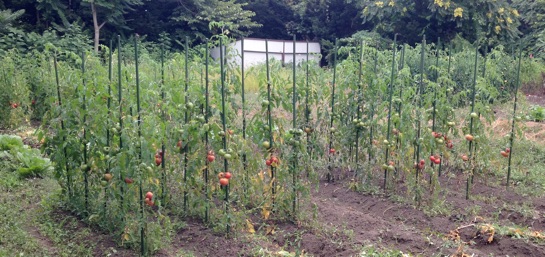
This tomatoes produced in the organic farm with natural ecosystems completely, 2017. The anti-oxidative activity of tomato fruits were enhanced to 1.2 times of ones from the conventional farm.
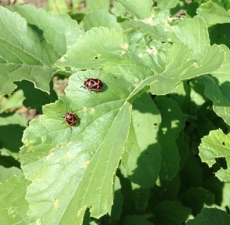
If anyone is interesting to the agriculture with natural ecosystem in Sapporo city in Hokkaido, please contact me. Please give me the opportunities of co-researches for that!
Furthermore, I’m interesting to the problems of grapevine’s short longevity in Hokkaido. According to the characteristics of this region, the phenomenon are caused by the multiple factors, coldness, snow pressure (vine training) and soil property. I would like to find the solutions for the issues.
